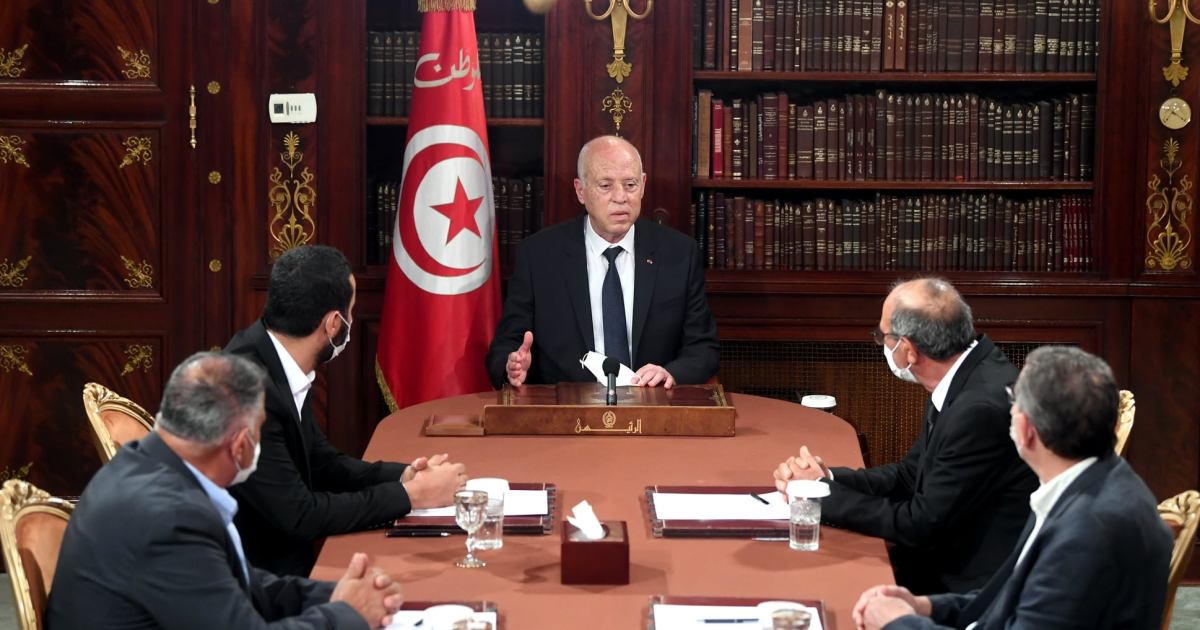Tunisian President Kais Saied decided yesterday, Monday, to suspend the work of state institutions for two days, while Tunisian parties called for preserving the gains of the 2011 revolution, and setting a road map within the framework of an urgent national conference for rescue, following the president’s decisions that included freezing the powers of Parliament and exempting the Prime Minister from his duties, which led to political crisis in the country.
The Tunisian presidency said - in a statement published on its website - that Saeed issued a presidential order to suspend work in government institutions of an administrative nature for a period of two days, starting today, Tuesday, with the possibility of extending the period of disruption of work.
According to the statement, the presidential order allows each relevant minister or local official to take a decision to assign a number of employees to specific work periods or to work remotely, and the internal security forces, military personnel, workers in health structures and institutions, and educational, childhood, training and higher education institutions who are subject to special arrangements are excluded from this presidential order. The statement did not explain it.
This comes in conjunction with Saeed’s announcement of imposing a night curfew for a month, after his sudden decisions on Sunday evening that included freezing the competencies of Parliament and relieving the Prime Minister of his duties, provided that he himself assumes the executive authority with the help of a government whose president is appointed, which is rejected by most forces. politics in the country.
Most of the parliamentary blocs in Tunisia opposed these decisions, as the Ennahda movement (53 deputies out of 217) considered them a coup, and the Qalb Tounes bloc (29 deputies) considered it a grave breach of the constitution, and the Democratic Current bloc (22 deputies) rejected the consequences, and described it as the Dignity Coalition bloc. (18 seats) invalid, while the People's Movement supported it (15 deputies).
In a subsequent statement, the parliament - chaired by the leader of the Ennahda movement, Rashid Ghannouchi - also strongly condemned Said's decisions, and announced his rejection of them.
Said's decisions came as a result of protests in several Tunisian governorates at the call of activists who demanded the overthrow of the ruling system and accused the opposition of failure, in light of political, economic and health crises.
National Rescue Conference
In the same context, the "Tunisia Project" movement (3 MPs) called - in a statement on Monday - Saeed to clarify his work program within the 30-day deadline he granted himself, by drawing up a road map within the framework of an urgent national conference for rescue.
The movement suggested that this conference should end "with the organization of a popular referendum to change the political system and amend the entire electoral system."
In turn, the "Long Live Tunisia" movement (10 MPs) urged - in a statement - the political class to assume its historical responsibility, make concessions to reduce the level of tension in the country, and rebuild bridges of trust with the people to launch the comprehensive health, economic and social rescue process.
The "Tunisia Horizons" movement (two deputies) called - in a statement - to the Presidency of the Republic and all political forces and civil society to mobilize to preserve the gains of the revolution, and to engage in reform, amendment and honest and courageous building for a true democratic path and an economic and social revolution that meets the aspirations of Tunisians.
She stressed the need for the exceptional measures that Saeed will announce to give guarantees at home and abroad that they work in accordance with the constitution (...), and that their aim is to uphold the rule of law and institutions, respect the republican system, and correct the democratic path.
On the other hand, US State Department spokesman Ned Price said - in a statement - that Minister Anthony Blinken urged the Tunisian president to "adhere to the principles of democracy and human rights", in a phone call on Monday.
He added that Blinken "urged President Saeed to continue an open dialogue with all political parties and the Tunisian people," noting that "the United States will continue to monitor the situation."
President Saeed had said - in a meeting with the heads of a number of professional organizations - that what he had done was not a coup, but measures according to the constitution after the country had reached an unacceptable level, as he put it.
He added that he applied Chapter 80 of the constitution according to his conditions, with the exception of the constitutional court's condition for his excuse, and that he informed both (the dismissed Prime Minister Hisham) al-Mashishi and Ghannouchi of the exceptional decisions he had taken.
For his part, Al-Mashishi pledged to hand over responsibility to anyone chosen by the president, stressing in a statement that he will not be disruptive or part of a problem that further complicates the country's situation.

